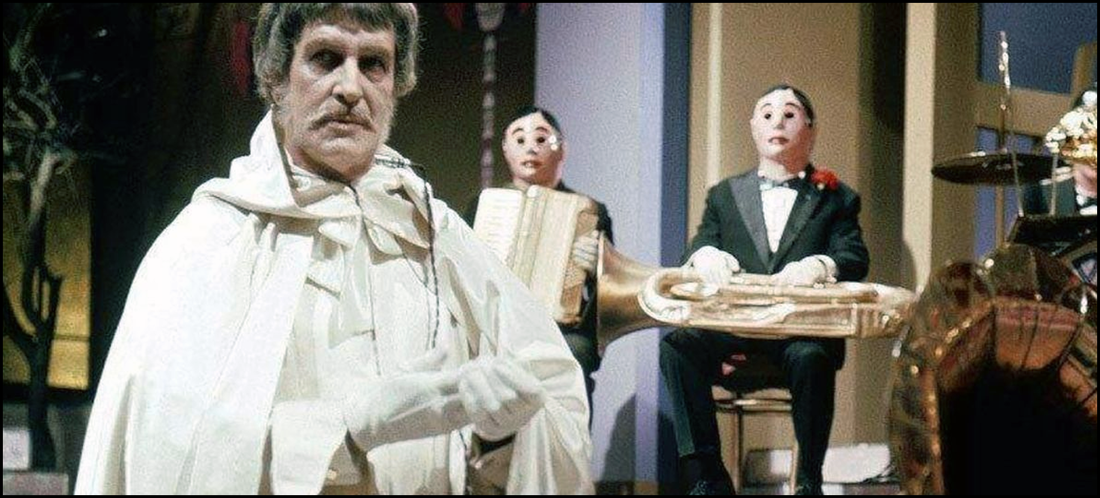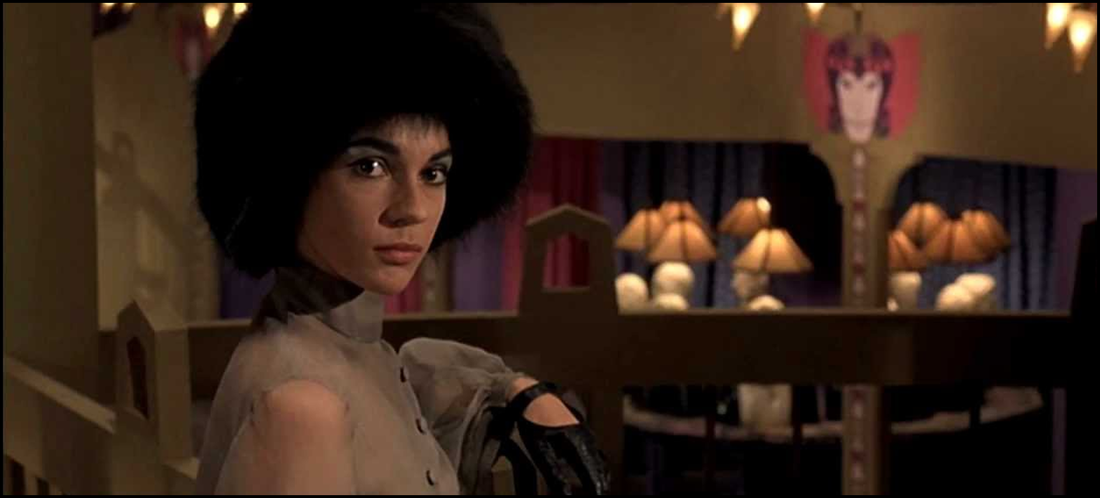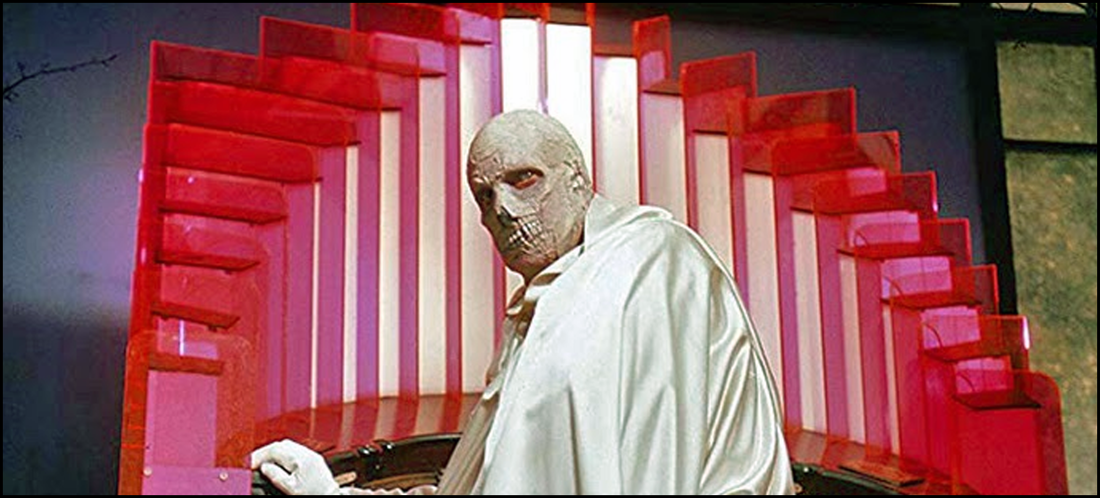Now, I’m not complaining. Rather, I’m only trying to give a bit of context for a memory. My parents weren’t around an awful lot when I was a young’un, and they’d often leave me in front of the television set when they had other things requiring their attention. (Again, this is not a complaint.) This never bothered me as it gave me ample opportunity to develop a love for film, and – like so many – I’ve probably seen and forgotten more flicks than I’ll ever recall.
Anyway, they were on their way out the door one Friday or Saturday night I believe it was, and they were entrusting me and my two sisters into a babysitter’s capable hands. As usual, I was on the couch, the television was on, and a commercial promotion came on advertising that evening’s primetime movie was going to be a little something something called The Abominable Dr. Phibes. I’m pretty sure it was mother who noticed me inching forward in my seat, and she turned to me with a warning: “I do not want you watching that picture. It’ll give you nightmares.”
So … I had no choice. I turned the channel. I did try later to go back to it, but the babysitter had overhead my mother’s words, stopping me short of a few scenes.
I did see it later – I don’t remember when or how old I was at that point – and I remember deciding that my mother didn’t know what she was talking about. Phibes wasn’t all that scary. Sure, it had its moments of tension, but it was tame by comparison to other things I squeezed in when she wasn’t watching.
(NOTE: The following review will contain minor spoilers necessary solely for the discussion of plot and/or characters. If you’re the type of reader who prefers a review entirely spoiler-free, then I’d encourage you to skip down to the last few paragraphs for the final assessment. If, however, you’re accepting of a few modest hints at ‘things to come,’ then read on …)
“Horror legend Vincent Price plays a diabolical doc seeking the ultimate in revenge with precision creepiness and surgical wit! After a team of surgeons botches his beloved wife’s operation, the distraught Dr. Phibes unleashes a score of Old-Testament atrocities – from a plague of locusts to an attack of rats – on his enemies that climax in what may be one of the eeriest endings on screen record!”
More than anything, Phibes is a revenge picture.
There’s no denying that James Whiton and William Goldstein’s script mixes elements of Horror, Comedy, and the household Melodrama all for good measure. Heck, depending upon what one makes of the doctor and his assistant Vulnavia’s relationship (she’s played by Virginia North), one might argue there’s an undercurrent of unrequited love possible woven into the picture’s visual spell. But at its core, what makes the clock tick is Phibes ongoing quest to see those who participated in any way with his wife’s failed surgery pay an equally steep price – namely, it’s an eye for an eye in some of the more creative deaths emerging from this era of film.
Director Robert Fuest explores methods to deliver the madness without all that much bloodshed. In fact, only a few sequences show any blood at all, as the narrative technique here is far more nuanced than what’s come from traditional European Horror features, which for a time kinda/sorta reveled in excess. In fact, some of Phibes’ creative kills made me wonder if folks who created the cinematic universe of the Saw films might’ve drawn a bit of inspiration; granted, their deaths are vastly more elaborate, but I can see some thematic similarities from the old to the new if even in small ways.
Still, it’s hard to grow offended by the doctor’s ongoing quest. He’s on his own personal ‘mission of justice,’ and he’ll stop at nothing, drawing inspiration from the Bible for the manner in which he’ll vanquish his next mortal foe. Price – though cleverly limited from showing us the range of his gifts vocally – performs admirably as the tortured soul who misses his dearly departed. Though he’s never afforded the opportunity to chew scenery the way he’s done in previous films, he shoulders the good, the bad, and even the goofy elements of perhaps the screen’s oddest antagonist, camping it up like some demented Phantom of the Opera (sans the opera but with the pipe organ). He properly mugs it up at every chance, showing audiences to true gift of expression even if only with his wide, pensive eyes. It's a masterful performance deserving of some praise.
In the end, perhaps it’s best to bear in mind that this isn’t a film that’s watched and appreciated for what it does so much as it is how its results are ultimately achieved.
The Abominable Dr. Phibes (1971) was produced by Amicus Productions. DVD distribution (for this particular release) is being coordinated by the very reliable Kino Lorber. As for the technical specifications? While there’s no mention of the disc being the beneficiary of any new scans, whatever master was used is fabulous: colors definitely pop – the flick makes great use of darkness and shadows along with a fair amount of ambient light in places – and everything sounds fabulous. As for the special features? Ahem. There are the obligatory adverts that tend to go hand-in-hand with most releases these days, but the real extras here are two different commentary tracks. Director Fuest appears alongside a host, and – if I’m being perfectly frank – it’s a difficult experience in part because Fuest (who passed in 2012 at the ripe age of 84) certainly sounds aged; as a consequence, his recollections are few, many of them pleasant, but he’s a bit hard to hear as his speech is a bit broken. (Age gets us all, my friends.) The second commentary is from Justin Humphreys – a Phibes ‘expert’ – and he provides a fascinating exploration of some of the major and minor facts that went into launching this small franchise. Some of what he details doesn’t quite align with what Fuest says on his track, but I’m going to chalk it all up to a few flawed memories.
Highly recommended, but … recommended for whom?
One of the kinda/sorta charming qualities of The Abominable Dr. Phibes is that it’s a Horror film that defies all of the conventions of the genre while still honoring them, and yet it’s also a Comedy that shouldn’t logically work but somehow still manages to effectively. In fact, Phibes – abominable it may be – is that rare visual specimen that resists being categorized into any single field or genre because it so effectively mixes, matches, and even mocks everything that makes it one type of flick or another. It’s a motion picture made for no particular audience and yet has found one – largely cult – with incredible crossover potential from fans of practically any group or sub-group.
In the interests of fairness, I’m pleased to disclose that the fine folks at Kino Lorber provided me with a complimentary Blu-ray of The Abominable Dr. Phibes (1971) by request (as part of their ‘Two Films By Robert Fuest Double Feature’) by request for the expressed purposes of completing this review; and their contribution to me in no way, shape, or form influenced my opinion of it.




 RSS Feed
RSS Feed